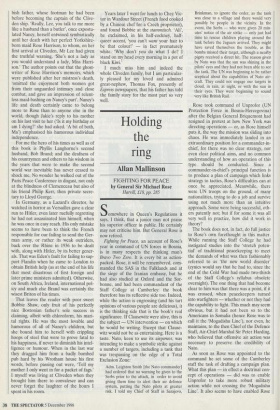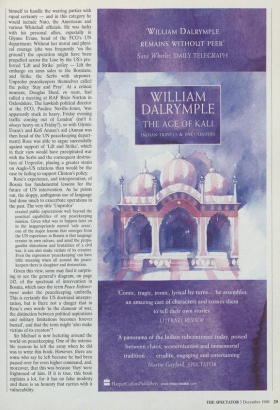Holding the ring
Allan Mallinson
FIGHTING FOR PEACE by General Sir Michael Rose Harvill, £18, pp. 285 Somewhere in Queen's Regulations it says, I think, that a junior may not praise his superior officer in public. He certainly may not criticise him. But General Rose is now retired.
Fighting for Peace, an account of Rose's year in command of UN forces in Bosnia, is in many respects the thinking man's Bravo Two Zero. It is every bit as action- packed. Rose, it will be remembered, com- manded the SAS in the Falklands and at the siege of the Iranian embassy, but he had also studied at Oxford and the Sor- bonne, and had been commandant of the Staff College at Camberley: the book therefore has its reflective side too. Indeed, while the action is engrossing (and his tart opinions of various people are delicious), it is the thinking side that is the book's real significance. If Clausewitz were alive, this is the subject — UN intervention — on which he would be writing. Except that Clause- witz would not be as entertaining. Here is a taste. Nato, keen to use its airpower, was intending to make a symbolic strike against a number of targets, including a tank that was trespassing on the edge of a Total Exclusion Zone:
Adm. Leighton Smith [the Nato commander] had ordered that no warning be given to the Serbs prior to the attack, in order to avoid giving them time to alert their air defence system, putting the Nato pilots at greater risk. I told my Chief of Staff in Sarajevo, Brinkman, to ignore the order, as the tank was close to a village and there would very possibly be people in the vicinity. In the event, the Serbs — who were given 20 min- utes' notice of the air strike — only just had time to rescue children playing around the tank before the Jaguars arrived. They might have saved themselves the trouble, as the bombs missed their target, although a nearby pigsty received a direct hit. The reason given by Nato was that the sun was shining in the pilots' eyes and they had not been able to see the tank. The UN was beginning to be rather sceptical about the capabilities of Nato air- craft. They could not engage our targets in cloud, in rain, at night, or with the sun in their eyes. They were beginning to sound very like British Rail.
Rose took command of Unprofor (UN Protection Force in Bosnia-Hercegovina) after the Belgian General Briquemont had resigned in protest at how New York was directing operations — or, as Rose himself puts it, the way the mission was sliding into chaos. He was immediately landed in an extraordinary position for a commander-in- chief, for there was no clear strategy, nor even clear political aims, and no common understanding of how an operation of this type should be conducted. Since a commander-in-chief's principal function is to produce a plan of campaign which links strategy to tactics, Rose's difficulties can at once be appreciated. Meanwhile, there were UN troops on the ground, of many nationalities, trying to do a job and survive using not much more than an intuitive approach. Some were being successful, oth- ers patently not; but if for some it was all very well in practice, how did it work in theory?
The book does not, in fact, do full justice to Rose's own forethought in this matter. While running the Staff College he had instigated studies into the 'stretch poten- tial' of traditional peacekeeping to meet the demands of what was then fashionably referred to as 'the new world disorder' (cynics would say that he had to, since the end of the Cold War had made two-thirds of the Staff College's syllabus obsolete overnight). The one thing that had become clear to him was that there was a point, if it was crossed, when peacekeepers turned into warfighters — whether or not they had the capability to fight. This much may seem obvious, but it had not been so to the Americans in Somalia (hence Rose was to call it the 'Mogadishu Line'), nor even, he maintains, to the then Chief of the Defence Staff, Air-Chief-Marshal Sir Peter Harding, who believed that offensive air action was necessary to preserve the credibility of Nato.
As soon as Rose was appointed to the command he set some of the Camberley staff the task of drafting a campaign plan. What this plan — in effect a doctrinal con- cept of operations — did was to enable Unprofor to take more robust military action while not crossing the 'Mogadishu Line'. It also seems to have enabled Rose himself to handle the warring parties with equal certainty — and in this category he would include Nato, the Americans and various Whitehall officials. He was lucky with his personal allies, especially in Glynne Evans, head of the FCO's UN department. Without her moral and physi- cal courage (she was frequently 'on the ground') the operation might have been propelled across the Line by the US's pre- ferred 'Lift and Strike' policy — Lift the embargo on arms sales to the Bosnians, and Strike the Serbs with airpower. Unprofor peacekeepers themselves called the policy 'Stay and Pray'. At a critical moment, Douglas Hurd, en route, had called a meeting at RAF Brize Norton in Oxfordshire. The hawkish political director at the FCO, Pauline Neville-Jones, 'was apparently stuck in heavy, Friday evening traffic coming out of London' (isn't it always heavy on a Friday?), so with Glynne Evans's and Kofi Annan's aid (Annan was then head of the UN peacekeeping depart- ment) Rose was able to argue successfully against support of 'Lift and Strike', which in their view would have precipitated war with the Serbs and the consequent destruc- tion of Unprofor, placing a greater strain on Anglo-US relations than would be the case by failing to support Clinton's policy.
Rose's experience, and interpretation, of Bosnia has fundamental lessons for the future of UN intervention. As he points out, the sloppy, ambiguous use of language had done much to exacerbate operations in the past. The very title `Unprofor'
created public expectations well beyond the practical capabilities of any peacekeeping mission. Given what was to happen later on in the inappropriately named 'safe areas', one of the major lessons that emerges from the UN experience in Bosnia is that language creates its own culture, and amid the propa- gandist distortions and brutalities of a civil war, it can also make victims of its creators. Even the expression 'peacekeeping' can have little meaning when all around the peace- keepers there is slaughter and destruction. Given this view, some may find it surpris-
ing to see the general's diagram, on page 242, of the spectrum of intervention in Bosnia, which uses the term Peace Enforce- ment under the peacekeeping umbrella.
This is certainly the US doctrinal interpre- tation, but is there not a danger that in Rose's own words 'in the clamour of war, the distinction between political aspirations and military limitations becomes forever buried', and that the term might 'also make victims of its creators'?
Sir Michael is now lecturing around the world on peacekeeping. One of the ostensi- ble reasons he left the army when he did was to write this book. However, there are some who say he left because he had been passed over for even higher command, and, moreover, that this was because 'they' were frightened of him. If it is true, this book explains a lot, for it has no false modesty and there is an honesty that carries with it vulnerability.



















































































 Previous page
Previous page